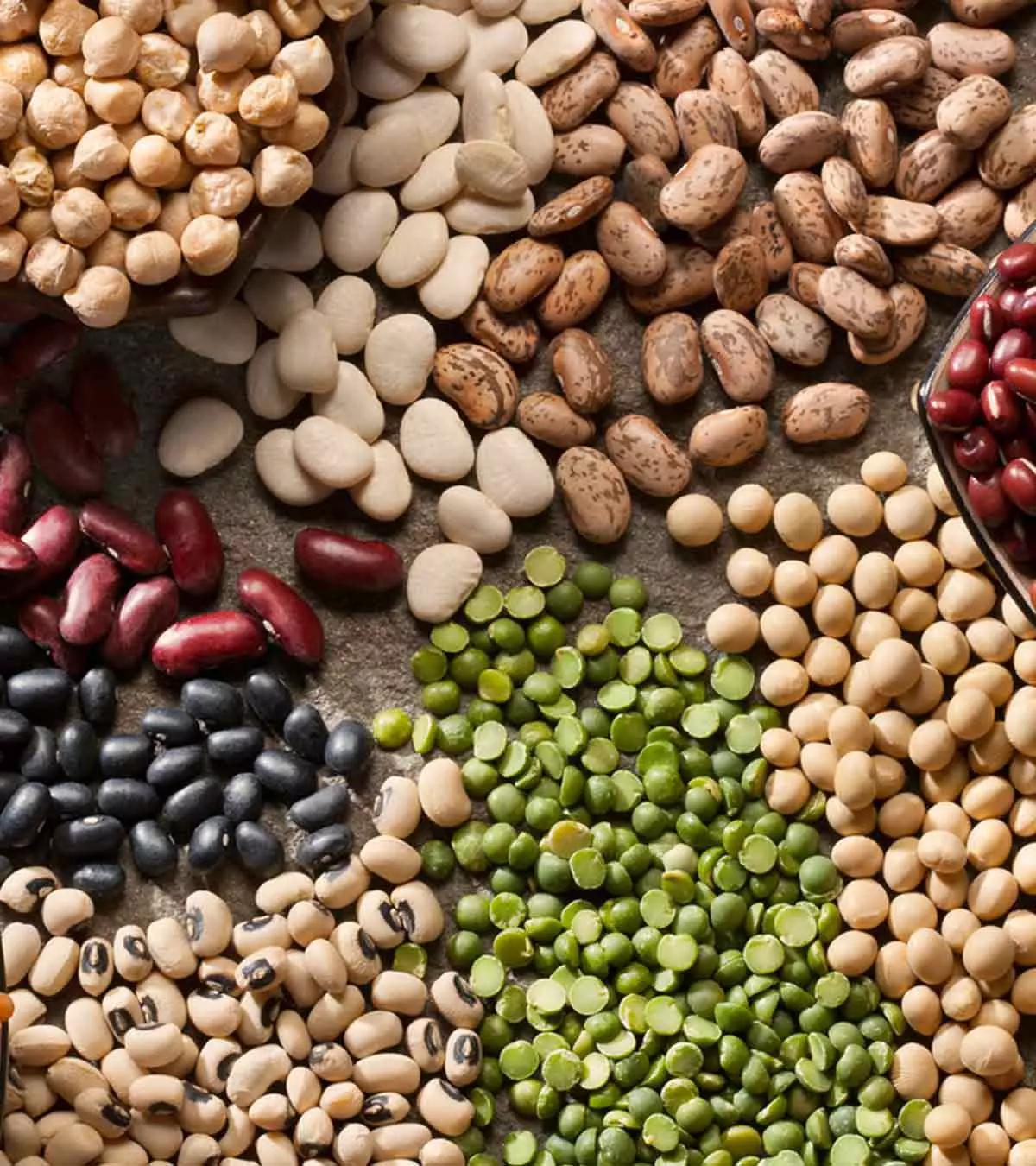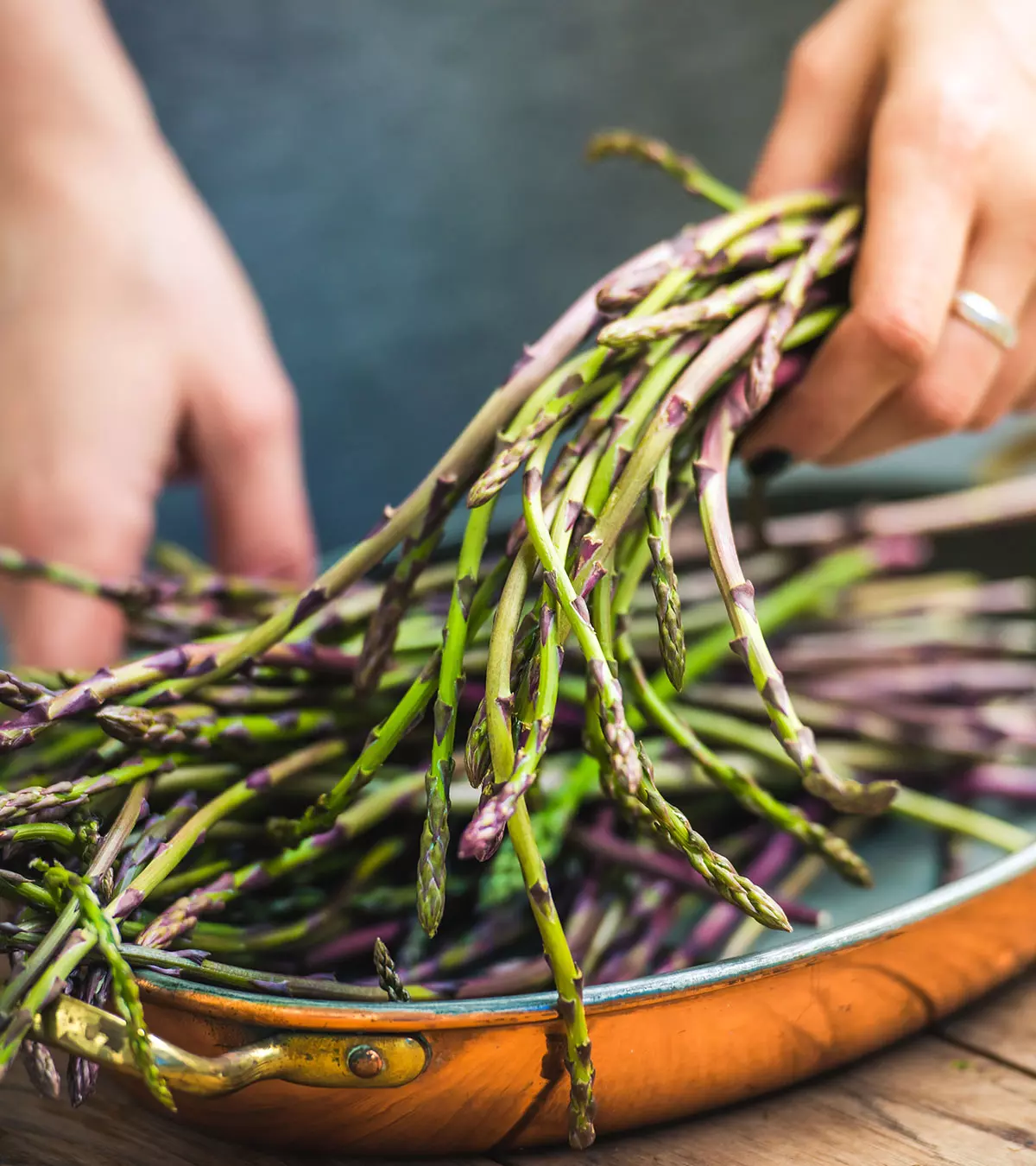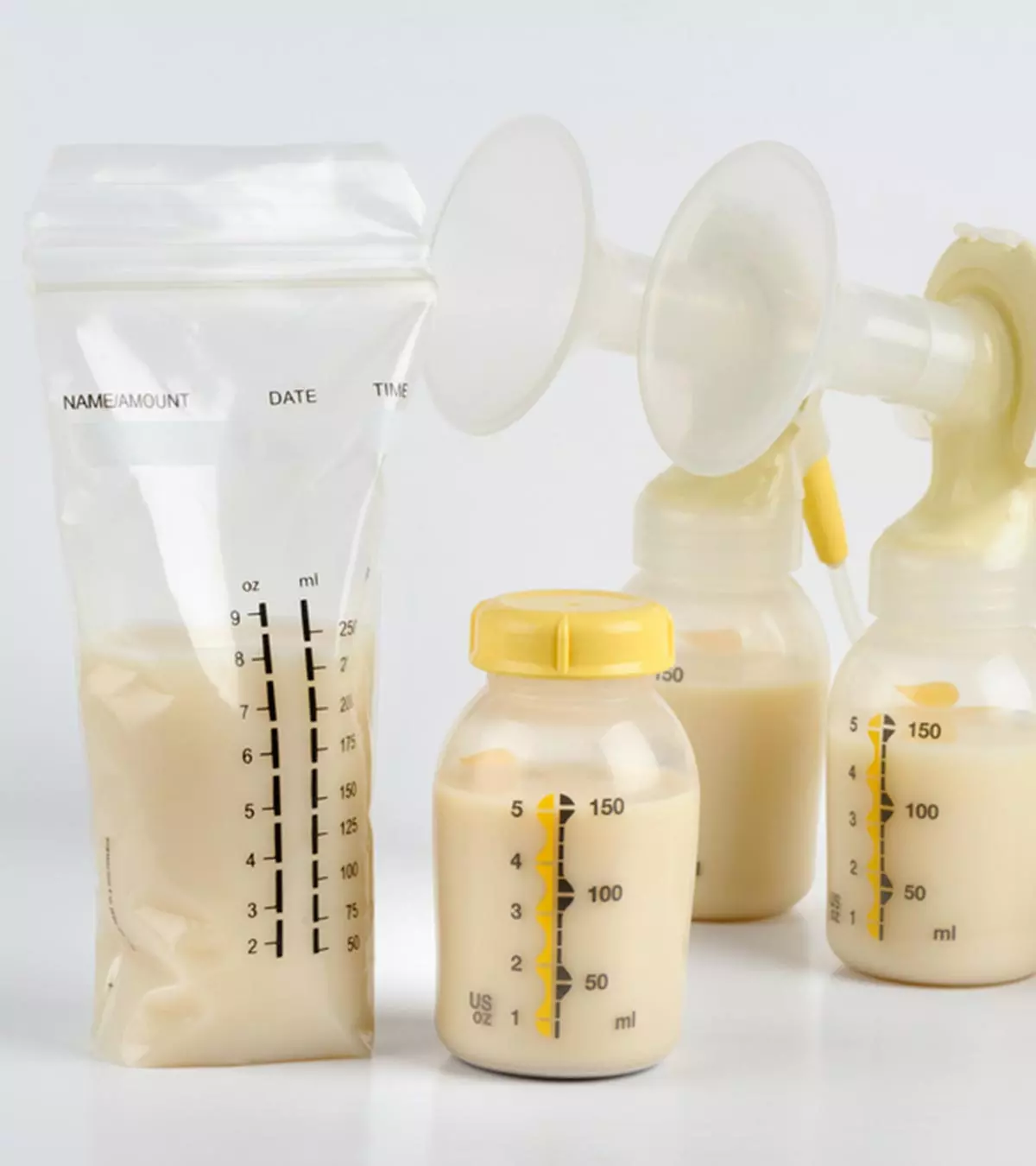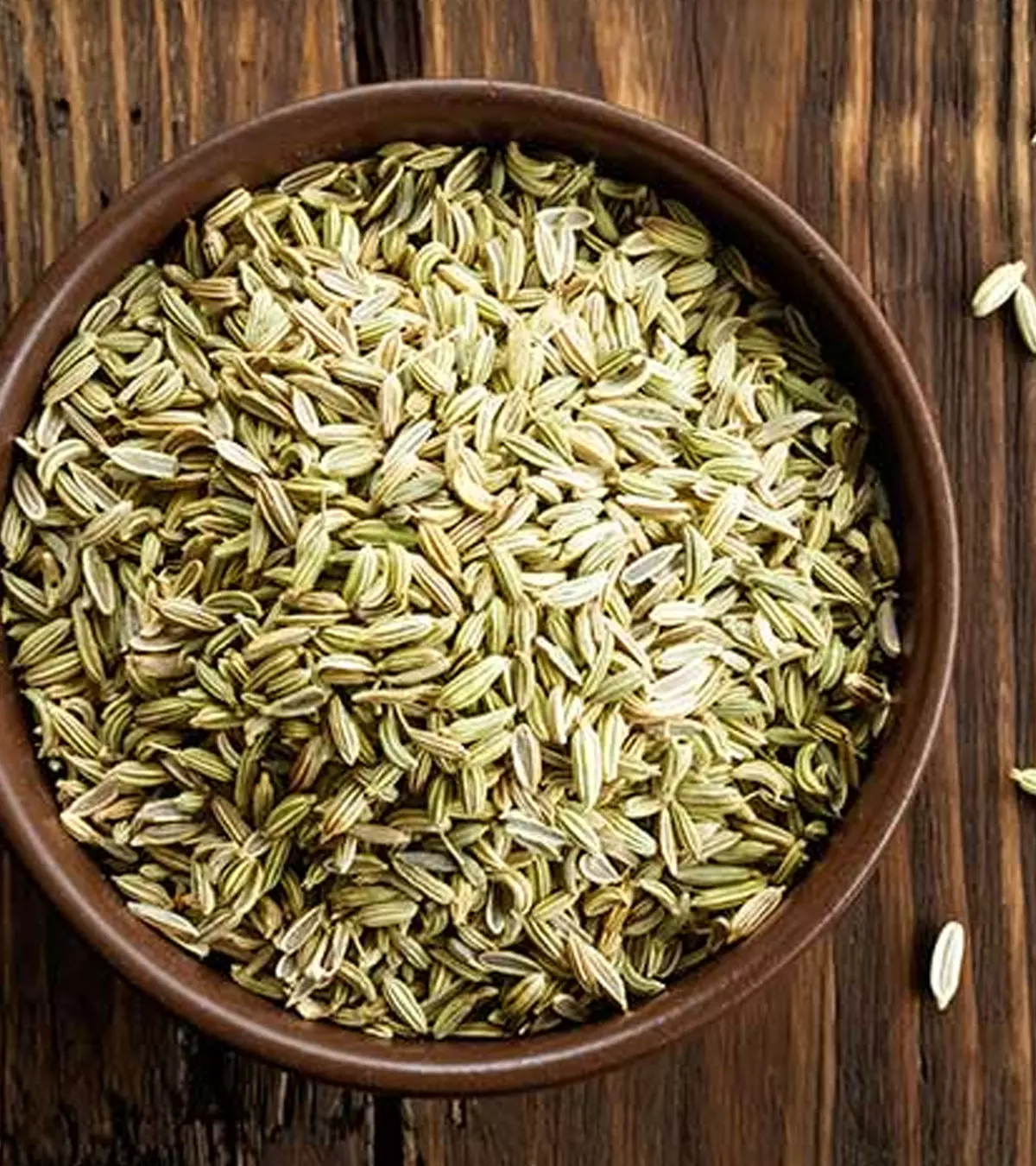
Image: ShutterStock
Mothers have long been using fennel to increase milk supply. A good milk supply is essential for newborn nutrition and growth, and the use of galactagogues for the increase of breast milk is not an uncommon practice.
A study conducted by researchers from multiple institutions showed that about 57.5% of 1294 nursing mothers resorted to using galactagogues. According to researchers, fennel has galactagogue (a food that increases milk supply) properties that promote lactation. However, you must know the facts and details about fennel before trying it. Read this post to learn about the effects of fennel on milk supply, how to consume these seeds, and the precautions you must take.
Key Pointers
- Fennel is thought to possess galactagogue properties that aid in boosting the breastfeeding supply.
- The chemical substance anethole in fennel is comparable to dopamine in stimulating the prolactin hormone to boost the breast milk supply.
- Fennel tea also helps in alleviating infantile colic, but may sometimes cause adverse reactions in some breastfed babies.
- It is ideal to consult a doctor before consuming fennel formulations such as oil, extracts, or pills while breastfeeding.
What Are Fennel Seeds?
Fennel seed is sourced from the Foeniculum vulgare plant and is a favorite herb used in several cuisines throughout the world. In India, it is called saunf and is often consumed raw after meals for healthy digestion. Powdered fennel is used as a food flavoring. Fennel oil is added to tea for flavor, or fennel seeds are directly infused in water with other herbs to make herbal tea. Let’s see if fennel helps in breastmilk supply.
Does Fennel Increase Milk Supply?

Image: Shutterstock
Yes, fennel seeds can increase the quantity of breastmilk but it is anecdotal, and lacks scientific evidence in humans. However, researchers acknowledge galactagogue properties of fennel as studies have found a significant increase in milk production among other mammals (1). Read on to know how fennel works in humans.
According to the book Bhavaprakashaof Bhavamishra Commentary by Dr. Bulusu Sitaram, ayurveda recognizes fennel, along with dill seeds, as a galactagogue. They are also known to relieve pain in the female genital organs and the spasmodic pain of abdominal organs, and act as appetizers and taste promoters. However, its role as a herbal remedy is too less to reach a conclusion and consult a doctor before proceeding with medications as such.
How Does Fennel Increase Breast Milk?
Fennel is one of the best foods that increase breastmilk. It contains a compound called anethole, which is chemically similar to the brain’s neurotransmitter dopamine. Dopamine binds to prolactiniA hormone produced by the pituitary gland which causes the breasts to grow, develop and produce milk , the hormone that stimulates the production of breastmilk and changes its chemical composition, making it ineffective in milk production.
Since anethole is identical, it competes with dopamine and binds with prolactin first, but preserves its milk stimulation properties. Therefore, there is a boost in the milk production due to drop in ineffective prolactin-dopamine compound (2). You might want to know the quantity of fennel to consume to make it effective.
How Much Fennel Helps Increase Milk Supply?
After a careful analysis of about 32 studies on galactagogues, researchers have found the results ambiguous. The scientists concluded that the use of fennel and other galactagogues is inconclusive and subject to more research (3). So, there is no means of telling how much fennel can increase breastmilk and by what quantity.
How To Consume Fennel When Breastfeeding?
You can eat fennel in several ways. Here are some of the options:
- If you consume a traditional Indian mouth freshener after meals, then you are quite probably having raw fennel seeds already. Since mouth fresheners are consumed in small quantities, you will ingest only a small amount of fennel this way.
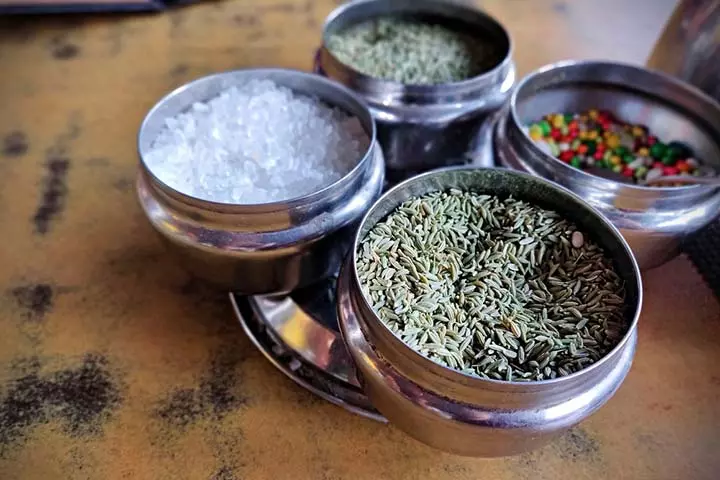
Image: IStock
- Fennel tea is a decoction of fennel seeds, leaves, and even the root bulb boiled together in water. The tea is naturally free of caffeine and helps in digestion.
Mariahadessa Ekere Tallie, a mother of two, recalls in her blog how she used fennel tea to enhance breastmilk production. She notes, “I added this tasty seed (fennel) to my rotation of herbal teas when my baby was colicky. Not only was it a delicious digestive aid, but it also helped increase my milk supply (i).”
- Fennel oil is made from crushing the fennel seeds to extract anethole-rich oil from it. Fennel essential oil can be added to regular tea or a glass of warm water. Do note that just like any other essential oil, fennel oil contains compounds in their concentrated quantities – beyond what you consume through raw seeds or tea. Therefore, stick to the suggested quantity of consumption mentioned on the bottle or consult a doctor/lactation expert before using it.
- Fennel extract tablets and capsules contain crushed fennel seeds encapsulated in gelatin. They are often consumed after meals to help ease after-meal bloating. But, just as fennel oil, the contents in capsules and tablets are in a concentrated form.
- Fennel belongs to the same botanical family as carrot. Therefore, fennel root leaves can be eaten.
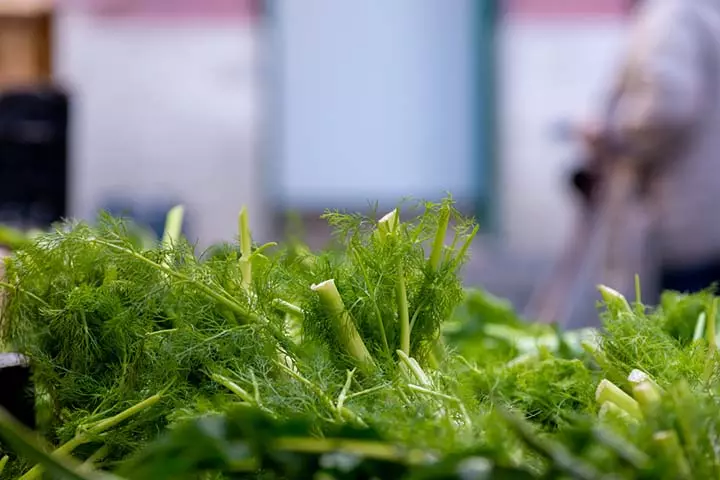
Image: IStock
- Fennel powder has been used in food preparation for centuries. Powdered fennel is available in supermarkets and can be added to your soups, stews, and curries or sprinkled on roasted vegetables to get the natural benefits of fennel.
Fennel preparations like oil and capsules may contain preservatives that could harm the baby, and it is best to avoid them or consult a doctor before using them.
 Did you know?
Did you know?Are There Any Side Effects Of Fennel When Breastfeeding?
No, there are no side effects of fennel consumption either on the mother or the baby’s health (1). It has GRAS (Generally Regarded As Safe) status in the US.
No study has directly pointed to any complication or problem arising out of adding fennel to the maternal diet with respect to breastfeeding (4). It means it is up to the mother’s discretion to consume it (5). Nevertheless, you can consult a lactation expert before consuming fennel to ensure that you rule out all possible side-effects. Several hospitals and medical centers recommend expectant and lactating mothers to avoid fennel under certain circumstances (6).
 Quick tip
Quick tipWhen To Avoid Fennel?
Avoid consuming fennel in the following scenarios:
- A history of gynecological problems or cancer: If you have had uterine complications or cancer of ovary/breast in the past, then you must avoid fennel. Fennel contains a few compounds that mimic the female hormone estrogen. An additional dose of estrogen may cause new complications (7).

Image: IStock
- Mother or baby has food allergy: Usually, mothers who are allergic to carrot, celery, and coriander may have a fennel allergy too as these plants belong to the same family. A mother may be aware of her allergies and can avoid fennel.
Watch out for any symptoms of allergy when you breastfeed the infant for the first time after having fennel. A baby with an allergy towards fennel will develop skin hives, abdominal pain, vomiting, and diarrhea, swollen face, and shortness of breath. The infant would also seem lethargic. Research has shown that fennel allergy is rare and thus it is quite unlikely to cause any complications to the breastfeeding baby (8). Nevertheless, take your baby to the doctor right away if you suspect an allergy.
 Caution
CautionBesides working towards increasing breastmilk in babies, fennel comes packed with many other benefits.
Are There Any Other Health Benefits Of Fennel?
Yes, the health benefits of fennel are aplenty.
- Fennel aids digestion. It is also scientifically acclaimed to relieve indigestion and alleviate the formation of gas in the digestive system.
- Researchers have found that regular consumption of fennel tea can help lower blood pressure in patients (9).

Image: IStock
- The fennel root, called fennel bulb, is an excellent source of dietary fiber and vitamins A, C, and K and potassium (10) (11).
- Fennel oil contains several antioxidants that have an anticarcinogenic effect on cells. These properties help shield a person from premature aging and also mitigate the chances of cancer including breast cancer (12).
- Laboratory research has shown that fennel reduces the intensity and side effects of polycystic ovary syndrome (PCOS), a condition where the ovaries enlarge with the formation of cysts. Researchers have noted that fennel could be helpful in other gynecological problems as well (13).
Frequently Asked Questions
1. How long does it take for fennel to increase a mother’s milk supply?
Due to the lack of conclusive evidence from medical research, it is impossible to predict how long it will take for fennel to increase a mother’s milk supply.
2. Can I take fennel and fenugreek together?
Yes, fennel and fenugreek are both anecdotally recommended galactagogues. You may use them to boost your milk supply under your doctor’s guidance (14).
3. Is fenugreek better than fennel for producing breast milk?
While fenugreek and fennel are both known galactagogues, it is unknown how effective each of them is (5). You can ask a lactation expert to suggest whether a combination of both or either one of them may be more effective for you.
4. Can fennel decrease milk supply?
No, fennel is considered to be a galactagogue, and hence, it may help increase and maintain a healthy milk supply (14).
5. Can I drink fennel tea daily while breastfeeding?
There are no known adverse effects or contraindications of fennel tea on maternal health. However, it would be better to start with half a cup of fennel tea once a day and slowly increase the quantity and frequency.
Having fennel for increasing milk supply has been commonly done by nursing women. Fennel seeds have been noted to have galactagogue properties, and these can be included in the diet. You can either have them raw as a mouth freshener, use them to make tea, or consume them in the form of tablets or extracts. However, before using any natural supplements containing fennel, it is advised that you consult a doctor or lactation expert to avoid any side effects to the baby or compromise milk quality and composition.
Infographic: Incorporating Fennel In Your Nursing Diet
A few research studies demonstrate that fennel seeds effectively boost milk production during breastfeeding. Other than consuming raw seeds, there are other ways to have fennel seeds when nursing to improve your milk supply, as mentioned in the infographic below. Illustration: Momjunction Design Team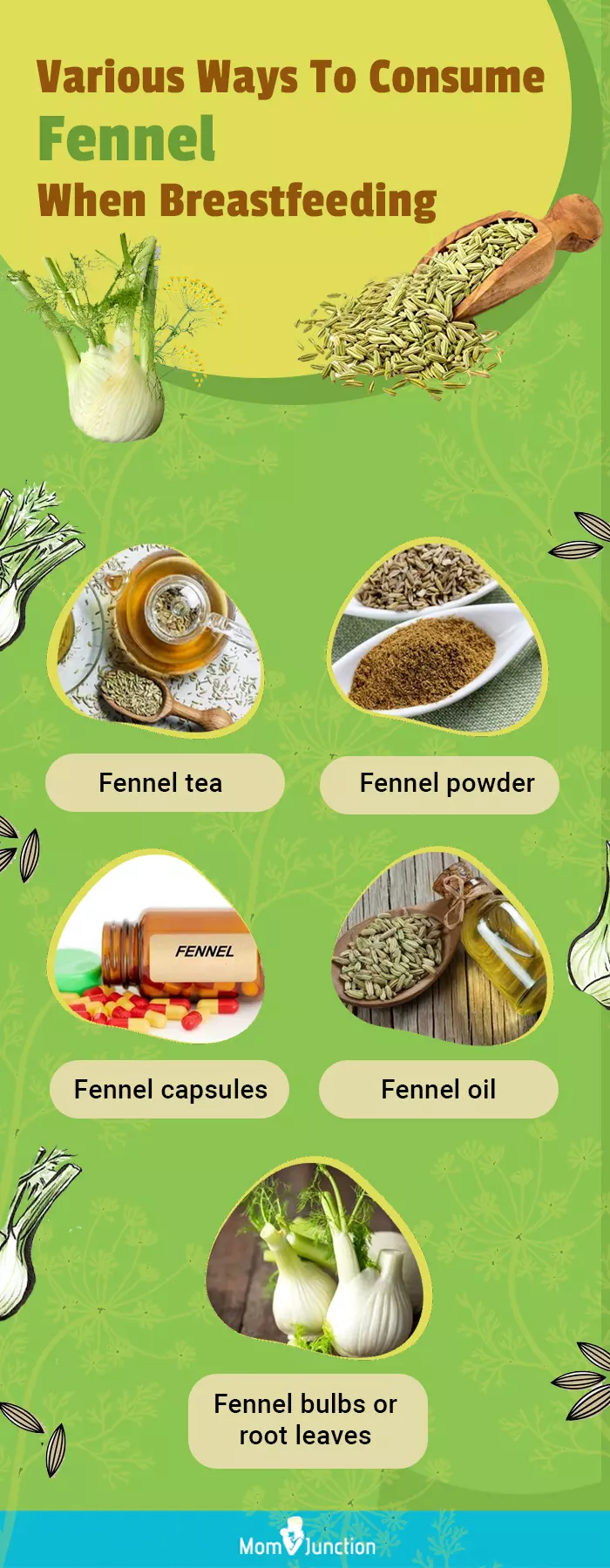
Personal Experience: Source
MomJunction articles include first-hand experiences to provide you with better insights through real-life narratives. Here are the sources of personal accounts referenced in this article.
i. Got breastmilk?https://thesagehoney.wordpress.com/tag/increasing-breast-milk/
References
- Felipe Penagos Tabares et al.; (2014); Pharmacological Overview of Galactogogues.
https://www.ncbi.nlm.nih.gov/pmc/articles/PMC4165197/ - Shamkant B. Badgujar et al.; (2014); Foeniculum vulgare Mill: A Review of Its Botany, Phytochemistry, Pharmacology, Contemporary Application, and Toxicology.
https://www.ncbi.nlm.nih.gov/pmc/articles/PMC4137549/ - Katarzyna Budzynska et al.; (2012); Systematic Review of Breastfeeding and Herbs.
https://www.ncbi.nlm.nih.gov/pmc/articles/PMC3523241/ - Katarzyna Budzynska et al.; (2013); Complementary, Holistic, and Integrative Medicine: Advice for Clinicians on Herbs and Breastfeeding.
https://www.ncbi.nlm.nih.gov/pmc/articles/PMC4530286/ - Tin Fei Sim et al.; (2015); The Use Perceived Effectiveness and Safety of Herbal Galactagogues During Breastfeeding: A Qualitative Study.
https://www.ncbi.nlm.nih.gov/pmc/articles/PMC4586661/ - Increasing Breast Milk Supply.
https://www.med.umich.edu/1libr/Gyn/Lactation/IncreasingMilkSupply.pdf - M Albert-Puleo; (1980); Fennel and anise as estrogenic agents.
https://pubmed.ncbi.nlm.nih.gov/6999244/ - Elide A. Pastorello et al.; (2013); Fennel Allergy Is a Lipid-Transfer Protein (LTP)-Related Food Hypersensitivity Associated with Peach Allergy.
https://pubs.acs.org/doi/abs/10.1021/jf303291k - Students Study Health Benefits Of Medicinal Plants.
https://www.ncbi.nlm.nih.gov/pmc/articles/PMC4137549/#:~:text=An%20intravenous%20administration%20of%20the%20lyophilized%20boiled%20water%20extract%20of%20leaves%20produced%20a%20significant%20dose%2Drelated%20reduction%20in%20arterial%20blood%20pressure%2C%20without%20affecting%20the%20heart%20rate%20or%20respiratory%20rate. - Tufts Nutrition Top 10. Overlooked veggies that are surprisingly good for you.
https://sites.tufts.edu/nutrition/winter-2016/tufts-nutrition-top-10/ - Fennel, bulb, raw.
https://fdc.nal.usda.gov/fdc-app.html#/food-details/169385/nutrients - Ragaa Hosny Mohamad et al.; (2011); Antioxidant and anticarcinogenic effects of methanolic extract and volatile oil of fennel seeds (Foeniculum vulgare).
https://pubmed.ncbi.nlm.nih.gov/21812646/ - Somayyeh Sadrefozalayi and Farah Farokhi; (2014); Effect of the aqueous extract of Foeniculum vulgare (fennel) on the kidney in experimental PCOS female rats.
https://www.ncbi.nlm.nih.gov/pmc/articles/PMC4103710/ - Selection and Use of Galactagogues
https://llli.org/news/selection-and-use-of-galactagogues-2/ - Infantile colic.
https://www.mountsinai.org/health-library/condition/infantile-colic - Fennel
https://www.ncbi.nlm.nih.gov/books/NBK501793/# - Complementary Corner: Essential oils associated with seizures.
https://www.medsafe.govt.nz/profs/PUArticles/ComplementaryCornerDecember2011.htm
Community Experiences
Join the conversation and become a part of our nurturing community! Share your stories, experiences, and insights to connect with fellow parents.
Read full bio of Regina Kincaid
Read full bio of Rohit Garoo
Read full bio of Swati Patwal
Read full bio of Ghazia Shah











